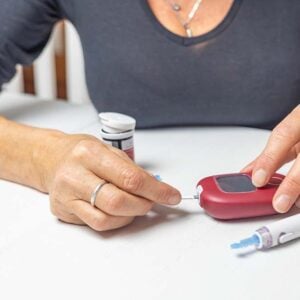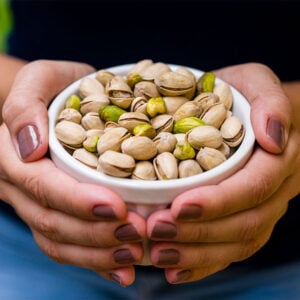
Would you pay $850 for a bowel movement? (Crazy!)
When your campsite is dug out of an ice wall on a high-altitude slope in frigid temperatures, bodily functions we take for granted can become a problem.
For instance, while I was climbing Mount Denali in Alaska, bowel movements became a big deal.
My climbing buddy, Paul, summed up this sentiment, “You know you’re getting old when having a good BM is better than having sex.”
In my experience, I often become constipated when climbing because of the low-fiber diet of freeze-dried foods.
Now, you might not be in the habit of climbing mountains, but you’ve probably had some experience with constipation.
Before you turn to laxatives, try one of my eight ways to battle chronic constipation. And if you’re really feeling brave, you can try my own personal “get-going” hack.
There are plenty of laxatives on the market that you can use in the short term—and you might even experience some relief.
However, they usually don’t solve the underlying problem of chronic constipation.
These drugs work by various mechanisms, such as:
- An osmotic effect of drawing water into the colon (Philips Milk of Magnesia),
- Oral stimulant effect by stimulating contractions in the colon (Senokot),
- Bulking agents (Benefiber),
- Rectal suppositories (Dulcolax), and
- Stool softeners (Colace).
One of the significant downsides of the new drugs is the costs. Some run nearly $500 per month.
In fact, one critic published a report figuring out the cost based on the results of the clinical trials and correcting for the placebo effect. He calculated that the cost of the drug was $850 per bowel movement.
You may think your pharmacy insurance will cover the cost and take the drug as the easy way out.
Ultimately, however, we all wind up paying the costs one way or another.
So, before you shell out $850 for a single bowel movement, try these simple, natural (MUCH cheaper) interventions first.
Dehydration is one of the most common—and easily fixable—causes of chronic constipation.
You can tell if you’re dehydrated by the color and volume of urine. With dehydration, the urine is often darker with small volumes.
If you don’t have enough water in your body, it will absorb the water it needs from your food once it enters your large intestines.
This results in hard, difficult-to-pass stools.
This is an easy fix: Drink more fluid. This will soften your stools and allow them to pass more easily.
Aim for at least eight cups daily, or more, if you’re exercising or in hot weather.
Another common issue is inadequate fiber intake, both soluble and insoluble.
Soluble fiber adds bulk to your stool. Insoluble fiber helps speed the transit of food in your digestive tract.
High-fiber foods include whole grains, vegetables, and legumes.
Foods like kale, Swiss chard, spinach, and cabbage are packed with non-digestible fiber that adds bulk to the stool and feeds the microflora in the intestines.
The microflora in the gut plays a role in normal bowel functioning.
You can boost the amount of beneficial flora in your gut by taking a probiotic supplement, eating fermented vegetables, or (one of my favorites) consuming organic, non-pasteurized kefir.
An interesting study did a head-to-head comparison of kiwifruit (two/day), prunes (100 grams/day), and psyllium seed husks (12 grams/day) for four weeks.
While the study found that all were effective, kiwifruit had the fewest side effects, so it was the winner.
This is a delicious way to keep regular.
P.S. Discover five other ways to CONQUER constipation. CLICK HERE.
Source:
Duboc H, et al. “Disruption of Circadian Rhythms and Gut Motility: An Overview of Underlying Mechanisms and Associated Pathologies.” J Clin Gastroenterol. 2020;54(5):405-414.
Written By Dr. Richard Gerhauser, M.D.
For years he’s been the trusted doctor for celebrities, world-class athletes, and countless seniors looking to reclaim their health.
And now…for the first time ever… he’s making his medical breakthroughs available to readers all across America.
Dr. Richard Gerhauser, M.D. is one of the most pioneering and innovative minds in medicine today – and he delivers cutting-edge cures each month through his Natural Health Response newsletter.
Natural Health Response readers get full access to Dr. Gerhauser’s protocols for chronic pain… heart disease… diabetes… Alzheimer’s… and even cancer. These are the very same treatments Dr. Gerhauser recommends to his own patients at his practice in Tucson, Arizona.
In addition to being a board-certified medical doctor, Dr. Gerhauser has earned two master’s degrees and has served as a clinical professor at the University of Arizona.
And as a physician at the world-famous Canyon Ranch, Dr. Gerhauser treated celebrities from around the world who paid dearly for the type of next-generation health information he provides Natural Health Response readers each month.
View More Free Articles
FDA Declares Popular Decongestant USELESS
If you’ve ever turned to over-the-counter (OTC) cold meds for relief from a stuffy nose, well this news may surprise you… The FDA is proposing a ban on oral phenylephrine, the ingredient in many popular decongestants. Why? Because it doesn’t work. Despite being the main decongestant ingredient in OTC brands like Sudafed PE, Tylenol Cold […]
5 Ways to “Beat the Bloat” This Thanksgiving
As we prepare for Thanksgiving week, there’s a lot to look forward to and be thankful for. Family gatherings, football games, great food, and even better desserts top the list. Then there are all the leftovers. It’s not a holiday that’s known for moderation. But if you’re not careful, overdoing it on Thanksgiving could leave […]
Eat THIS to Reduce Your Risk of 14 Cancers
I’m a meat-and-potatoes guy. I’ll never turn down a big, juicy steak. But even more than that… I’m a fish guy. There’s not much I like more than a perfectly grilled salmon. I hope you do, too, because salmon contains two potent nutrients tied to a reduced risk of 14 types of cancer. Omega-3s are […]
The Bad Habit Robbing YEARS from Your Life
I often get eye-rolls when I stress just how essential lifestyle factors like light reducing pollution and grounding are good for health. But new research continually proves that I’ve been right all along. Today, a critical new study shows that something I’ve warned you about for YEARS is tied to a 34 percent increased risk […]
Reduce Colon Cancer Risk by 30%
More than 150,000 people are diagnosed with colorectal cancer yearly. Another 35,000 will get a liver cancer diagnosis. But if you have type 2 diabetes, your risk of developing one of these skyrockets—a 47 percent increased risk of colorectal cancer, and a two to three times higher risk of liver cancer. That’s why I’m excited […]
“Dinner Plate” Danger Raises Prostate Risk
Did you know that prostate cancer is FAR more prevalent in developed parts of the world than in less developed regions? Strange right? What is it about our modern, developed society that’s attacking our male population? There are MANY answers to this question. The primary one I will focus on today is a significant environmental […]
The 5-Minute Solution to Better Blood Pressure
Are you one of the millions who battle the so-called “silent killer” hypertension? And do you have five minutes to spare daily? If so, you could be well on your way to significantly healthier blood pressure. Sound too good to be true? A new study proves it. And the best part? It’s incredibly easy If […]
“Eye-Opening” Benefits of Pistachios
Imagine if there were a daily snack that could protect your vision. Well, a recent study brings good news for the 20 million U.S. adults already battling macular degeneration—the leading cause of vision loss for those over 60. Adding a handful of pistachios to your diet might help shield your eyesight. Let’s take a “look.” […]
Get Better Blood Sugar This Holiday Season
Let’s face it. The holidays are NOT good for your waistline… or your blood sugar levels. Potlucks, family dinners, cookie exchanges, Christmas parties… you know the drill. So, if you’re one of the 98 million people on the brink of type 2 diabetes, it’s VITAL to take steps to manage your blood sugar levels as […]
Common Vitamin Is a Hidden Colon Cancer Shield
With aggressive colon cancer on the rise in younger people, I’m always on the lookout for research showing how we can all lower our risks. Over the past few months, I’ve shared studies showing that stress, oral bacteria, obesity, and circadian disruption are all tied to colon cancer. And just last week I revealed how […]










